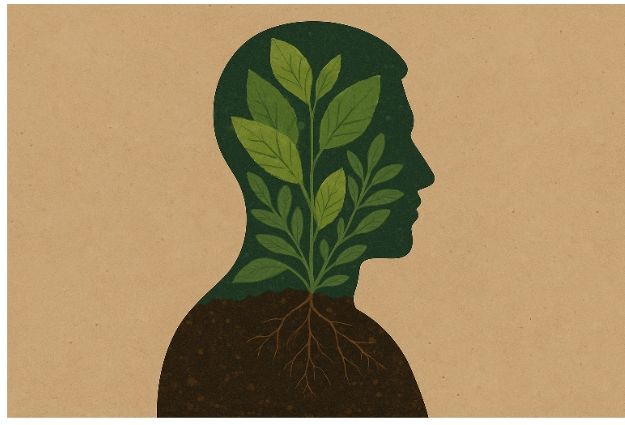
A paradox exists in modern medicine: there is more technology than ever before, yet the systems are taxed, chronic diseases are on the rise, and the planet is suffering under the weight of high-intensity medical production. Antibiotics, nutraceuticals, industrial farming, and ultra-processed foods are all puzzle pieces in a health model that usually only treats symptoms but seldom addresses the ecosystem from which they arise.
Some aspects of Ayurveda are, therefore, surprisingly relevant at this point. These insights relate not only to the use of healthy foods, herbs, yoga and meditation; at the heart of Ayurveda is a worldview based on ecology: one where human health is seen as a reflection of environmental health. This viewpoint carries renewed weight in an era of climate instability, disrupted food chains, and global burnout.
There Are Two Uncoupled Systems Called Health and Environment
Modernity in Ayurveda appears in its vehemence that the health of an individual cannot be disentangled from the health of the ecosystem in which he is embedded. Ayurvedic teachings describe human resilience being influenced by seasons, soil quality, daylight, microbes, rainfall, and dietary rhythms, millennia before "planetary health" became the new frontier of research.
That idea connects to current leading ecological health research:
Gut diversity is favored by eating seasonal, minimally processed foods
Air quality and heat patterns correlate to chronic inflammation
Depletion of soil nutrients reflects the micronutrient status of food crops
Ecosystems rich in microbial life support healthier immune responses in humans
While Ayurveda used a different idiom to describe these, the scientific parallels are striking. The simple advance: that human beings cannot be cured while disregarding the environment nourishing them.
Seasonal Living as a Sustainability Model
Seasonal eating was not a philosophy in Ayurveda. It was a means of survival. Foods were chosen on the basis of what the climate provided naturally at that time. Cold months meant heavier grounding foods predominated, while warmer months emphasized cooling and hydrating foods.
Now, modern sustainable science reflects the same principle. Seasonal foods cut down on:
Food transport over thousands of kilometers
Cold storage
Synthetic means of food preservation
Energy use for out-of-season supply chains
This does not mean a call for blind traditionalism; rather, it signifies that often ecological eating will sustain both planetary and personal health.
The Role of Moderation in a High-Consumption Era
Balance is the essence of Ayurveda.
Abstinence and excess are not considered balance- they are opposite extremes.
And this may be the point that pertains most to modern medicine. Today, many diseases are considered diseases of overconsumption: sugar, stimulants, chemicals, plastics, screen time, calories, antibiotics, and even stress. Ironically, these are the same things that are burdening healthcare systems every decade.
Ayurveda sees health as a slow, regular practice rather than emergency intervention. It values tiny daily habits over sudden large ones. Such an outlook minimizes waste, cost, and the need for intensive treatments. A sustainable health model would thus emphasize prevention over production.
Soil, Plants, and Biodiversity as Medicine
Another area where Ayurveda tends to be underestimated is pharmacology. It is not random picking of plants; it is actually an entire ecosystem-based pharmacy built around biodiversity. Classical texts describe in detail hundreds of species, most of which grow under specific soil, climate, and altitude conditions.
Modern ecological interpretation gives two consequences:
1. Biodiverse regions tend to impart richer medicinal constituents
2. Nutrient-depleted ecosystems lead to weaker phytochemical potentials
This brings into play the vulnerability of sustainable harvesting. Overharvesting destroys micro-ecosystems and creates pressure on plant populations.
With climate change and land misuse accelerating, the populations of these medicinal plants in India, Sri Lanka, and Nepal are already under threat. So the same question is being asked now, from the perspective of modern integrative medicine, that Ayurveda raised many centuries ago: how do we maintain the environment that produces our medicines?
Circadian Rhythm as Climate-Conscious Health Practice
In the last few years, research on circadian rhythms has exploded. Sleep scientists, oncologists, metabolic scientists, and psychologists are all now talking about biological clocks at the core of health outcomes. But Ayurveda has taught about daily rhythm for thousands of years.
Unlike the circadian approach embedding hormones and neuronal signaling, Ayurveda aims at a much wider ecological view. It assumes human beings have evolved through predictable natural cycles:
Sunrise and sunset
Seasonal shifts in temperature
Soil and crop patterns
Planetary light cycles
In Ayurveda, aligning with these rhythms supports the sustenance of these rhythms themselves. Less physiological stress is involved, better metabolic efficiency is gained, and alignment with the natural rhythm of the human body is refreshed. This perspective seems surprisingly aligned with today's chronobiology.
A More Sustainable Healthcare Future
Integrative medicine often treats Ayurveda as an "alternative system," but perhaps the greatest value is in what it teaches concerning sustainability. Modern healthcare is becoming ever more expensive, ever more burdened by resource issues, and ever further away from the environmental realities underlying the challenges to health. In this context, the ecological lens offered by Ayurveda becomes a counterbalance.
Its message is quite simple: health is about relationships. These relationships are between body, mind, environment, and daily choices. When one element suffers deprivation, the others inevitably follow.
This framework appears less like ancient philosophy in times of planetary change and more like a blueprint for sustainable health policy.
Media Contact
Company Name: Curenatural
Contact Person: David
Email: Send Email
City: New York
Country: United States
Website: https://curenatural.com/
